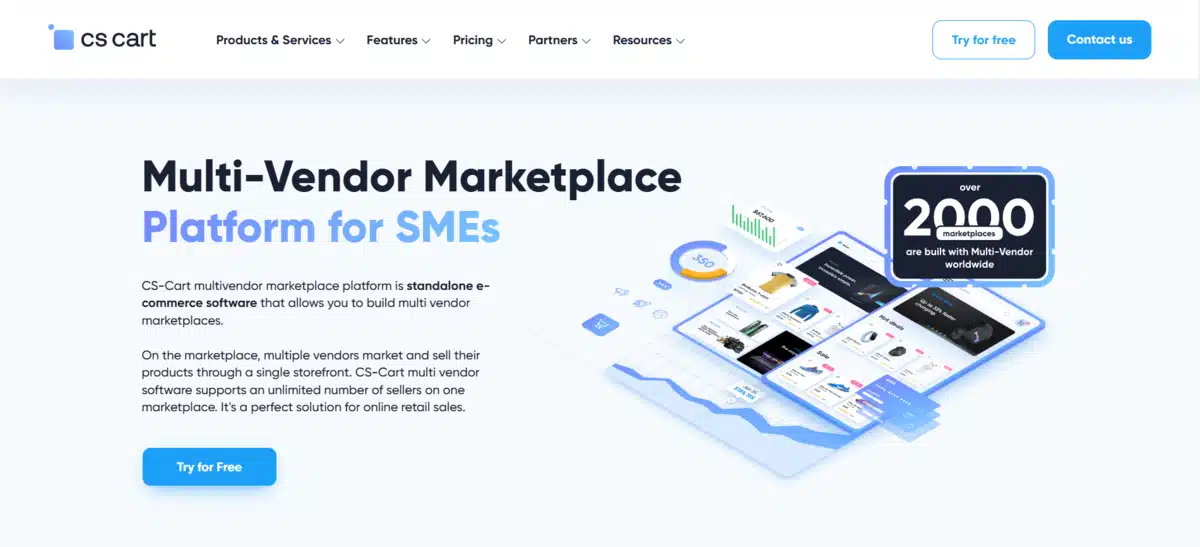Top 5 Open-Source Marketplace Software

Today, online marketplaces seem to be thriving in more ways than ever. A range of eCommerce or service-oriented marketplaces increasingly demands robust and versatile solutions.
Open-source marketplace software offers a cost-effective and flexible solution for creating your marketplace.
Here, we present the top 5 open-source marketplace software, their features and benefits, along with why it is apt for your business.
Table of Contents
What is Open-Source Marketplace Software?

Open-source marketplace software is a marketplace where the source code is publicly available to be modified and customized. Such a marketplace allows businesses to:
- Customize functionalities to specific needs.
- Save on the cost of proprietary solutions.
- Enjoy the benefits of the community of developers who continually improve the solutions.
With open-source solutions, businesses are able to scale and adapt to an ever-changing market by being flexible and in control.
Why Choose Open-Source for Your Marketplace?
Here are a few strong reasons to opt for open-source marketplace software:
- Cost Efficiency: The majority of the open-source solutions are free to use, which eliminates the huge licensing fees.
- Customization: Businesses can modify the software according to their branding and operational needs.
- Community Support: Developers around the world contribute to the open-source platforms, making sure that there are constant updates and robust security.
- Scalability: The open-source software can grow with your business and support increased traffic and functionality.
- Transparency: The code is so open that there are no hidden limitations or backdoors.
Top 5 Open-Source Marketplace Software
Let’s explore the top 5 open-source marketplace software that is revolutionizing the way businesses operate online.
1. Sharetribe

Sharetribe is the best software for businesses that are establishing service-based or product marketplaces. It’s easy, flexible, and has numerous developer-friendly tools, and it’s one of those favourites among startups and huge enterprises.
Key Features:
- API-first architecture for smooth integrations.
- Custom front-end, using React or other technologies.
- Full-fledged admin dashboard for listings, user, and transaction management
Pros:
- Offers pre-made templates to launch fast.
- Has really strong community support with proper documentation.
- Supports payment gateways and multi-currency options.
Ideal For: Service marketplaces like car rentals, freelance platforms, and accommodation booking.
2. Arcadier

Arcadier Open Source is a robust platform that caters to various marketplace types, including B2B, B2C, and P2P. It’s known for its intuitive interface and scalability.
Key Features:
- Modular design for easy personalization.
- Multi-language support and multi-currency capacity.
- Analytics and reporting as built-in tools.
Pros:
- User-friendly interface for administrators and sellers.
- Advanced search and filtering capabilities.
- Strong emphasis on security and data protection.
Ideal For: E-commerce platforms, B2B trading hubs, and niche marketplaces.
3. CS-Cart Multi-Vendor

CS-Cart Multi-Vendor is a fully featured solution for an eCommerce marketplace. The multi-vendor eCommerce solution takes the entire complexity out of launching and running a marketplace.
Key Features:
- Drag-and-drop layout editor for quick design changes.
- Built-in SEO tools to enhance search engine visibility.
- Advanced vendor management system with individual dashboards.
Pros:
- Extensive add-ons and themes are available for customization.
- Regular updates with new features and improvements.
- Supports multiple languages and currencies.
Ideal For: Retail marketplaces and multi-vendor platforms.
4. Magento

Magento is the eCommerce company now a part of Adobe. Its open-source version supports marketplace functionality. Its primary advantage lies in scalability’s for businesses looking at a potential growth rate within the near future.
Key Features:
- Flexible product catalogue management.
- Robust API for integrations with third-party tools.
- Advanced analytics and reporting capabilities.
Pros:
- Extensive library of extensions and themes.
- Strong community support with a wealth of resources.
- Enterprise-level features in an open-source package.
Ideal For: Large-scale eCommerce marketplaces and enterprises.
5. WordPress with WooCommerce and Dokan

This makes the popular CMS turn into a feature-rich marketplace platform through the combination of WordPress, WooCommerce, and the Dokan plugin. This is unbeatable flexibility and ease of use.
Key Features:
- Intuitive interface with drag-and-drop builder.
- Multi-vendor capabilities through the Dokan plugin.
- SEO-friendly structure for better search engine rankings.
Pros:
- Easy to set up and manage, even for beginners.
- Extensive library of plugins and themes for customization.
- Large community support and regular updates.
Ideal For: Small to medium-sized businesses and niche marketplaces.
How to Choose the Right Open Source Marketplace Software

When selecting the ideal platform for your marketplace, consider the following factors:
- Business Requirements: Decide whether you need a product-based, service-based, or hybrid marketplace.
- Budget: Decide on the overheads of hosting, developing, and maintaining the system.
- Scalability: Ensure that the platform can scale up with increased traffic and functionality as the business grows.
- Community Support: Ensure there is a vibrant community and good support channels.
- Customization needs: Select a platform where your technical skills and your customization needs align.
Conclusion
Building a marketplace does not need to be an expensive, restrictive process.
The solutions highlighted above in the top 5 open source marketplace software are there to help businesses of all different sizes find the right kind of solution for their needs.
From the flexibility of Sharetribe Flex to the great versatility of WordPress with WooCommerce and Dokan, these platforms empower entrepreneurs who can bring their marketplace ideas to life.
Are you ready to embark on your marketplace journey? Explore these open-source options and take the first step towards building a thriving online business today!
FAQs
What is open-source marketplace software?
Open-source marketplace software allows access to source code for customization and flexibility in building online marketplaces.
Why choose open-source marketplace software?
It offers cost efficiency, customization, scalability, and strong community support.
Which open-source platform is best for eCommerce?
CS-Cart Multi-Vendor and Magento Open Source are excellent choices for eCommerce marketplaces.
Can WordPress be used for marketplaces?
Yes, with WooCommerce and the Dokan plugin, WordPress becomes a robust multi-vendor platform.
Are open-source platforms secure?
Yes, they are regularly updated with security patches by their active developer communities.




